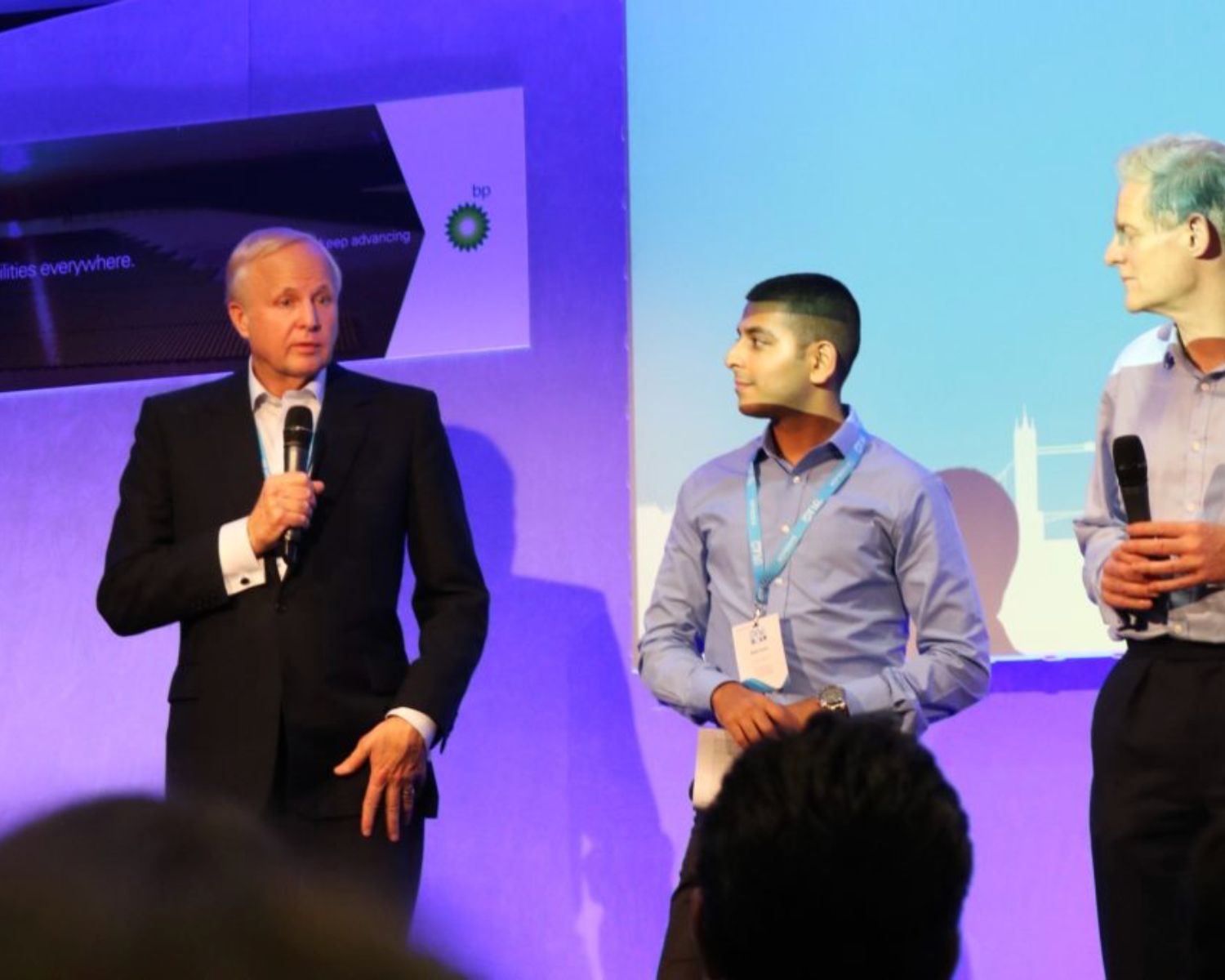The 2019 One Young World Summit: reflections of a BP scholar
My One Young World experience was more exhilarating, frustrating, and uplifting than I could have ever expected.
 More than 2,000 delegates from over 190 countries convened in London in October for the 2019 One Young World Summit, a conference designed to accelerate social impact and tackle global issues, aided by the counsel of influential political, business and humanitarian leaders. From media freedom to planetary health, artificial intelligence (AI) to poverty alleviation, this event brought together leaders from every niche to work together in recognition of the united power of youth.
More than 2,000 delegates from over 190 countries convened in London in October for the 2019 One Young World Summit, a conference designed to accelerate social impact and tackle global issues, aided by the counsel of influential political, business and humanitarian leaders. From media freedom to planetary health, artificial intelligence (AI) to poverty alleviation, this event brought together leaders from every niche to work together in recognition of the united power of youth.
My topic of interest was the global energy transition. Having researched petroleum divestment initiatives in the Amazon, and currently assessing the scalability of direct air carbon capture technologies, I was familiar with the public sector’s approach to sustainability, but significantly less so regarding how individual companies were acting. In 2019, British Petroleum (BP) was listed by the Fortune Global 500 as the seventh-largest company by revenue at 303 billion USD. As one of the world’s oil and gas supermajors, they’re active in nearly 80 countries, producing 3.7 million barrels of oil per day. Operating at such a great scale, BP is a case study for how fossil fuel companies perceive their role in fighting climate change. Marketed as a corporation that recognizes the importance of doing so, I wanted to hear about what they were doing in response to this call for action.

Prior to the summit, we were invited to a reception at BP headquarters to meet with their executive team and learn about their current sustainability strategy. From streamlining existing operations, such as targeting methane intensity or providing lower-emission products, to investing in renewables and creating accreditation programs, I was surprised by both the breadth and robustness of their commitments.
Three concepts formed the foundation for this strategy:
- Energy has and continues to be a major driver of human development and wellbeing,
- Global energy demand will increase by 20-30% by 2040, and
- Emissions must decrease by 50% by 2040 to meet the Paris Agreement goals.
These three concepts may seem contradictory, but they may not have to be – if we do it right. BP’s strategy targets two areas: efficiency optimization of existing energy sources, and development and deployment of renewables. These are undoubtedly pivotal in the energy transition, and traditional players like BP may be best positioned to act effectively. Therefore, efforts to include and encourage these corporations to contribute in a collaborative manner should be taken, an area that One Young World excels in. Over 180 corporations were represented at the summit, including Shell, Total, and Audi, each with their own team of employees or sponsored delegates. Of the two hundred or so attendees I personally met, all had affiliations with a participating partner.
I found the heavy corporate presence to be an uncommon, but a highly constructive addition. Spaces were created for open discussion between young environmentalists and fossil fuel executives, a gap that has been missing in the environmental movement lately. Instead, climate marches and protests have become the favoured communication method of the public in response to the fossil fuel industry’s traditional silence or dismissal of environmental concerns. This conference sought to alleviate those tensions. BP’s CEO, Bob Dudley and chief economist, Spencer Dale hosted a Q&A where they made themselves vulnerable to a wide range of criticisms, including exploration expenditures, lobbying efforts, and greenwashing. They invited climate activists to join them for a debate on whether oil and gas companies could effectively advance the lower carbon energy transition as they are currently acting. In the pursuit of collaboration and trust, their willingness to engage with this demographic in such an open manner was extremely admirable.
 I was impressed by BP’s transparency, but more so, surprised by how differently they framed the barriers to climate action than the grassroot movements I was used to being a part of. The most prominent theme that emerged from this discussion is the idea of responsibility. Environmentalists pushed BP to accept a greater degree of accountability for the creation and facilitation of climate change, due to their continued production of fossil fuels, state influence, and their historic marketing of oil as a necessary component of development. Since they have profited from fossil fuels, they should pay its costs. Environmentalists cited BP’s existing initiatives as insufficient, with only 5% of company revenues dedicated to renewables. They believe BP has the ability to push for the energy transition, but they are not. Therefore, they place the onus on individual companies and their inaction in switching to renewables as being a major barrier for climate action.
I was impressed by BP’s transparency, but more so, surprised by how differently they framed the barriers to climate action than the grassroot movements I was used to being a part of. The most prominent theme that emerged from this discussion is the idea of responsibility. Environmentalists pushed BP to accept a greater degree of accountability for the creation and facilitation of climate change, due to their continued production of fossil fuels, state influence, and their historic marketing of oil as a necessary component of development. Since they have profited from fossil fuels, they should pay its costs. Environmentalists cited BP’s existing initiatives as insufficient, with only 5% of company revenues dedicated to renewables. They believe BP has the ability to push for the energy transition, but they are not. Therefore, they place the onus on individual companies and their inaction in switching to renewables as being a major barrier for climate action.
Yet, although BP agreed that the private sector needs to do more, they cited the lack of external support from states, competitors or markets as barriers to their ability to act on their own. With oil companies just producing 10% of the world’s oil and gas reserves (the remainder primarily from state-owned companies), they argued any divestment of the 2% of global oil production BP accounts for would be absorbed by their competitors. Regarding markets, BP invested billions into renewables in the early 2000s, but had to write them off. In 2017, with significant growth in both the economic and energy efficiency of solar, they invested $200 million to acquire a 43% stake in Lightsource, the largest solar developer in Europe. The major barrier to climate action BP perceives, is a lack of united action, that they can only move if others move with them, or their efforts would be ineffective. In defense of BP’s historic role in the expansion of the oil industry, Bob Dudley compared petroleum to the industrial revolution and the invention of cars. Although they all greatly contribute to climate change, they have also greatly increased average lifespans, decreased child mortality rates, and improved overall human development metrics. They believe energy is inextricably linked to human development, which must continue, we just have to do it better.
I found this divide particularly intriguing because the degree to which companies are held responsible, or view themselves as responsible, is the minimum amount of action we demand of them. It determines what we consider enough. Similarly, how BP’s efforts are viewed may also set a precedent for how other oil and gas companies may choose to act. Although the conversation was primarily centred on the viability of renewables in developing countries or the company’s investment portfolio, there was a clear subtext divide regarding why BP should respond to the climate crisis. Environmentalists want the private sector to act, and BP wants everyone to act with them. It seems that if we are to establish the sector-wide commitment to clean energy needed to end climate change, these motivations need to be immensely clear beyond profit. For some, BP has far exceeded what is demanded of them, they should be rewarded for what they have achieved. For many more, they have done nowhere near enough.

I’m curious to see where that benchmark will move as we near the goal of net-zero emissions by 2050, and what solutions the fossil fuel industry will employ to meet it. But one aspect I have absolute confidence in is the motivation and ability of youth to accelerate the climate solution. Despite differing views on how much the company is responsible for acting, every BP employee or scholar I met accepted the individual duty to do more, simply because we could. There were researchers, exploring how to expedite the development of solar cells or biofuels. There were community builders, such as campus club organizers, or founders of nonprofits for women in STEM. And there were many, many environmental leaders in the private sector, entrepreneurs deploying solar lamps in rural India, or creating electric grids in Morocco. If every company, state or citizen demonstrated the same commitment, conviction and courage that any of the delegates I met at One Young World exhibited, climate change would not exist. Let’s raise our benchmarks for every party to make that our new goal.
Denise Lee is a 2017-2018 Munk One cohort alumna, and a third-year student at the University of Toronto, double majoring in economics and environmental science. Last month she was one of 30 scholars to receive the BP Advancing Energy Scholarship to attend the 2019 One Young World Summit in London, awarded to young leaders focusing on advancing the energy transition, creating low carbon businesses, and mitigating the impact of climate change.

